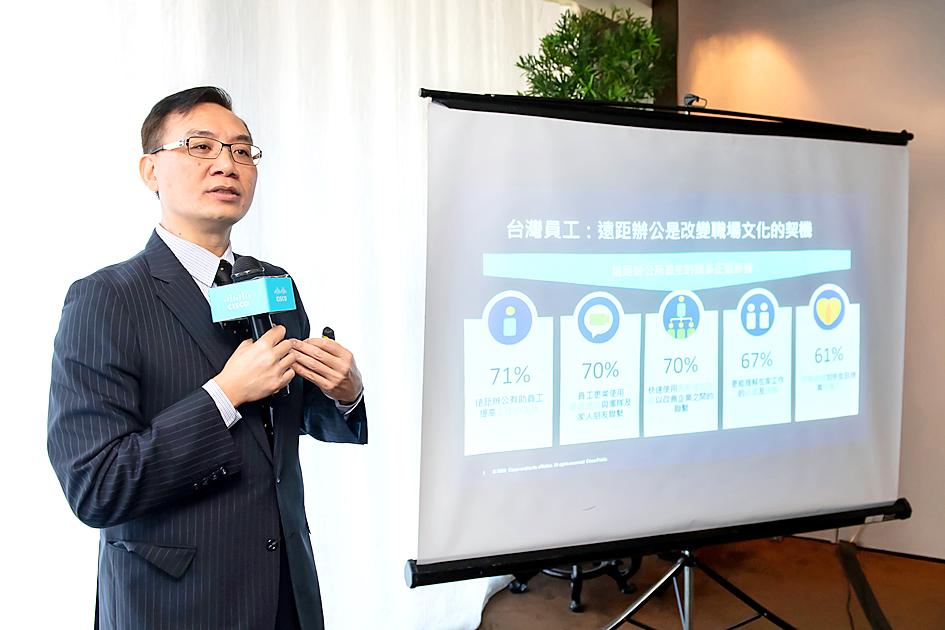Cisco Systems Inc is next month to open a software development center in New Taipei City’s Linkou District (林口), the first of its kind for the US firm in the Asia-Pacific Region, the company said on Wednesday.
The center is to be inaugurated after the Lunar New Year holiday, which ends on Feb. 16, Cisco vice president of greater China operations George Chen (陳志惟), who is also head of Cisco Systems Taiwan Ltd (台灣思科系統), told a news conference in Taipei.
The US information technology (IT), networking and cybersecurity solutions provider also released a workforce report at the news conference.

Photo courtesy of Cisco Systems Inc
Cisco Taiwan chief technology officer Robert Feng (馮志良) told reporters that the center would house tech start-ups from across the nation.
With the assistance of Cisco’s presence, these firms are expected to speed up their product development, he added.
In the initial stage, the center would focus on rolling out information security solutions, by combining the resources of Cisco and the start-ups, Feng said.
In the long term, Cisco would work with these companies to put out new applications in the global market, he said.
Cisco already operates similar centers in the US and Europe.
Meanwhile, Chen said that when he assumed the role of head of Cisco Taiwan three years ago, the company had about 60 employees, but now has more than 100, focusing on a wide range of areas, such as information security, IT services and 5G networking.
Citing the workforce report, Chen said that last year presented a challenge to enterprises in Taiwan and their employees amid the COVID-19 pandemic, which led the company to have employees work from home.
Despite the adjustment to curtail infections, many employees said they had a positive experience working remotely, as they found they were able to work more efficiently, he said.
The workforce report showed that 49 percent of the employees polled said they felt more energized working from home, 39 percent said they felt healthier and 37 percent said they were happier.
The report showed that before the pandemic, only 7 percent of employees in Taiwan worked remotely.
Since the pandemic, 71 percent of them said that online work has boosted their independence, 71 percent said they used teleconferencing more often than before and 70 percent agreed that communication could be improved through new technology.
The report analyzed data collected from more than 14,000 employees in 14 markets in the Asia-Pacific region, with remote working the focus of the questions, Cisco said.

The US dollar was trading at NT$29.7 at 10am today on the Taipei Foreign Exchange, as the New Taiwan dollar gained NT$1.364 from the previous close last week. The NT dollar continued to rise today, after surging 3.07 percent on Friday. After opening at NT$30.91, the NT dollar gained more than NT$1 in just 15 minutes, briefly passing the NT$30 mark. Before the US Department of the Treasury's semi-annual currency report came out, expectations that the NT dollar would keep rising were already building. The NT dollar on Friday closed at NT$31.064, up by NT$0.953 — a 3.07 percent single-day gain. Today,

‘SHORT TERM’: The local currency would likely remain strong in the near term, driven by anticipated US trade pressure, capital inflows and expectations of a US Fed rate cut The US dollar is expected to fall below NT$30 in the near term, as traders anticipate increased pressure from Washington for Taiwan to allow the New Taiwan dollar to appreciate, Cathay United Bank (國泰世華銀行) chief economist Lin Chi-chao (林啟超) said. Following a sharp drop in the greenback against the NT dollar on Friday, Lin told the Central News Agency that the local currency is likely to remain strong in the short term, driven in part by market psychology surrounding anticipated US policy pressure. On Friday, the US dollar fell NT$0.953, or 3.07 percent, closing at NT$31.064 — its lowest level since Jan.

The New Taiwan dollar and Taiwanese stocks surged on signs that trade tensions between the world’s top two economies might start easing and as US tech earnings boosted the outlook of the nation’s semiconductor exports. The NT dollar strengthened as much as 3.8 percent versus the US dollar to 30.815, the biggest intraday gain since January 2011, closing at NT$31.064. The benchmark TAIEX jumped 2.73 percent to outperform the region’s equity gauges. Outlook for global trade improved after China said it is assessing possible trade talks with the US, providing a boost for the nation’s currency and shares. As the NT dollar

PRESSURE EXPECTED: The appreciation of the NT dollar reflected expectations that Washington would press Taiwan to boost its currency against the US dollar, dealers said Taiwan’s export-oriented semiconductor and auto part manufacturers are expecting their margins to be affected by large foreign exchange losses as the New Taiwan dollar continued to appreciate sharply against the US dollar yesterday. Among major semiconductor manufacturers, ASE Technology Holding Co (日月光), the world’s largest integrated circuit (IC) packaging and testing services provider, said that whenever the NT dollar rises NT$1 against the greenback, its gross margin is cut by about 1.5 percent. The NT dollar traded as strong as NT$29.59 per US dollar before trimming gains to close NT$0.919, or 2.96 percent, higher at NT$30.145 yesterday in Taipei trading